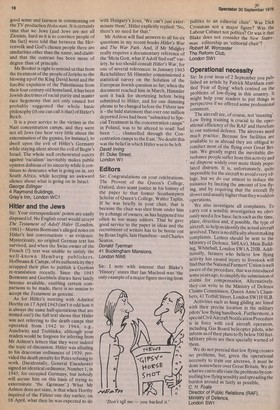Operational necessity
Sir: In your issue of 2 September you published an article by Patrick Marnham entitled 'Fear of flying' which centred on the problems of low-flying in this country. It might help your readers to put things in perspective if we offered some professional comment.
The aircraft are, of course, not 'stunting'. Low flying training is crucial to the operational efficiency of the RAF and therefore to our national defence. The aircrews need much practice. Because few facilities are available to us abroad they are obliged to conduct most of the flying over Great Britain. We greatly regret the inevitable disturbance people suffer from this activity and we disperse widely over more thinly populated districts. It is, unfortunately, quite impossible for the aircraft to avoid every village, but we do our utmost to reduce the nuisance by limiting the amount of low flying, and by requiring that the aircraft fly slower and usually higher than they would on operations.
We also investigate all complaints. To carry out a sensible investigation we obviously need a few basic facts such as the time, place, direction and, if possible, the type of aircraft, to help us identify the actual aircraft involved. There is no difficulty about making complaints. Letters should be sent to the Ministry of Defence, S4f(Air), Main Building, Whitehall, London SW1A 2HB. Additionally, farmers who believe low flying activity has caused injury to livestock will find that the National Farmers' Union is well aware of the procedure, that was introduced some years ago, to simplify the submission of claims for compensation. Alternatively, they can write to the Ministry of Defence Claims Commission, Queen Anne's Chambers, 41 Tothill Street, London SWIH 9LB.
Activities such as hang gliding are listed with their precise location in the military pilots' low flying handbook. Furthermore, a special Civil Aircraft Notification Procedure is in force with civil aircraft operators, including Gas Board helicopter pilots, who inform us of their plans to fly below 500 feet. Military pilots are then specially warned of them.
We do not pretend that low flying creates no problems, but, given the operational necessity to train our aircrews, it must be done somewhere over Great Britain. We do what we can to alleviate the problems by controlling low flying sensibly and spreading the burden around as fairly as possible. C. H. Foale Director of Public Relations (RAF), Ministry of Defence, London SW1


































 Previous page
Previous page